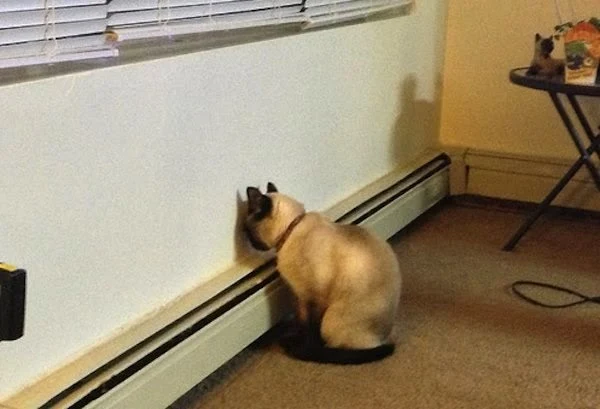The behavior is called "head pressing", and it is characterized by the compulsive act of pressing the head against something solid for extended periods of time.
Head Pressing is a medical emergency.
If you see your pet exhibiting this behavior, you should seek veterinary attention immediately. Everyone should know about this, please read and share this article.
Head pressing generally indicates damage to the nervous system or a neurological condition or illness and it is very important that you take your dog or cat to a veterinarian for diagnosis.
The causes of head pressing behavior can be varied, but may include:
Head pressing generally indicates damage to the nervous system or a neurological condition or illness and it is very important that you take your dog or cat to a veterinarian for diagnosis.
The causes of head pressing behavior can be varied, but may include:
- Prosencephalon disease (in which the forebrain and thalamus parts of the brain are damaged)
- Tumors (eg brain or skull)
- Liver shunt
- Toxic poisoning (e.g. lead poisoning)
- Metabolic disorder, such as hyper or hyponatremia (too much, or too little Sodium in the body’s blood plasma)
- Stroke
- Encephalitis (inflammation of the brain and spinal cord. Many things can cause Encephalitis. Infectious causes include bacteria, viruses, parasites, fungi and tick-transmitted disease).
- Hepatic encephalopathy (metabolic disorder as result of liver disease)
- Infection of the nervous system (rabies, parasites, bacterial, viral or fungal infection)
- Head trauma
Head pressing can be just one symptom among other behaviors and symptoms of neurological or metabolic distress.
Other behaviors and symptoms can include:
- Constant pacing
- Walking in circles
- Face rubbing (pushing head into ground)
- Damaged reflexes
- Visual problems
- Seizures
- Getting stuck in corners
- Staring at walls
By recognizing head pressing and other neurologically-related symptoms in your dog or cat, you could potentially save their lives!
So, in summary – it’s not that head pressing in itself is a danger, but a lack of understanding of the underlying causes on the part of the owner that can result in tragedy.
Please give this article a Share On Facebook or Repin On Pinterest. Someone may read it, and then recognize these symptoms in their pet. You could save its life.
So, in summary – it’s not that head pressing in itself is a danger, but a lack of understanding of the underlying causes on the part of the owner that can result in tragedy.
Please give this article a Share On Facebook or Repin On Pinterest. Someone may read it, and then recognize these symptoms in their pet. You could save its life.
Cats communicate with us using body language and if a cat head butts you, he is extremely content, greeting you with love and affection. And, remember, he is bunting, or leaving his mark on you to signify that you are safe, trusting and comfortable. This is very different from "head pressing".
You might like:






.jpg)
